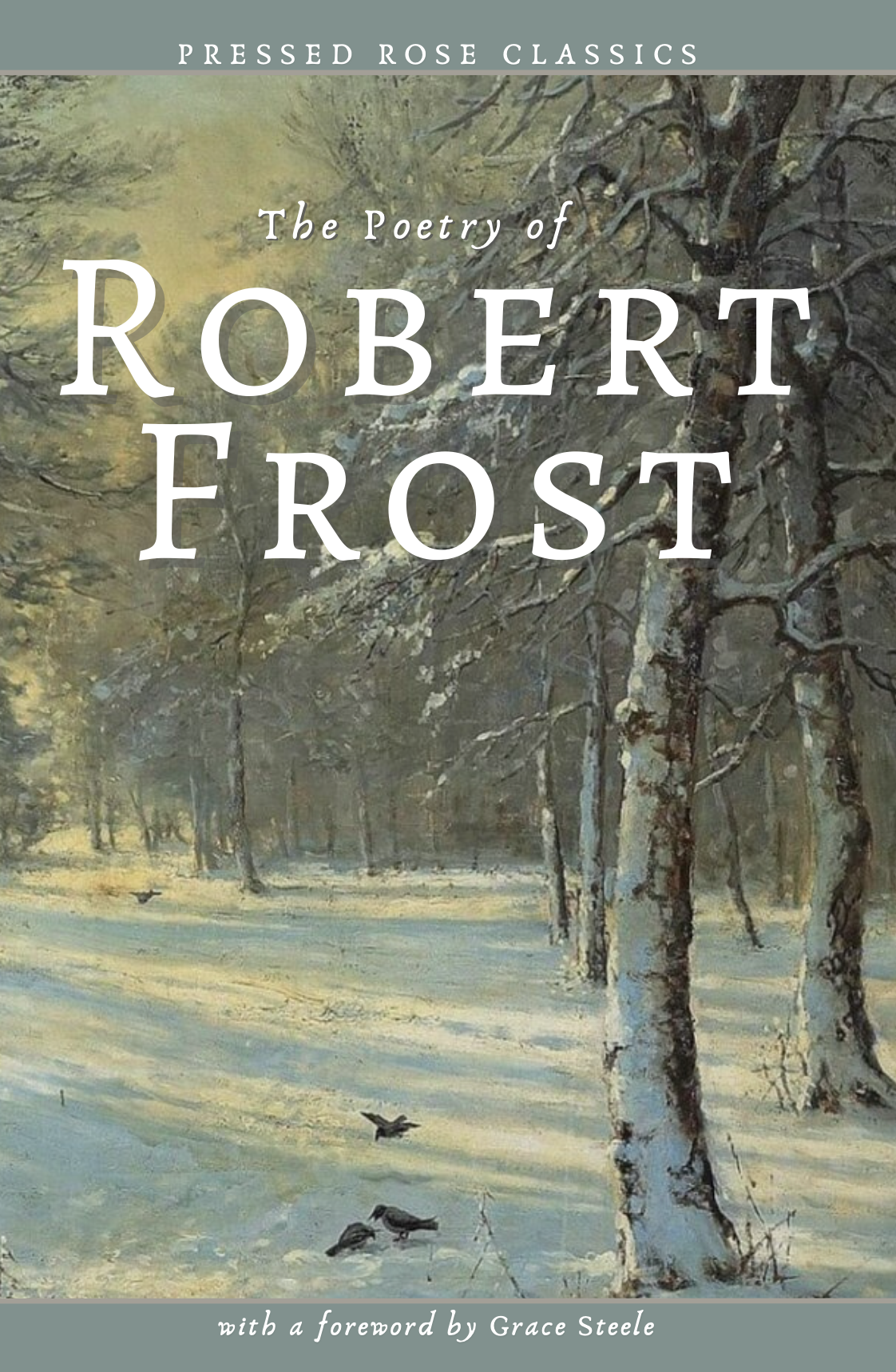I am publishing a collection of Robert Frost’s poetry through Pressed Rose Classics, and I would like to share the foreword here. I hope it encourages you to read Frost’s poetry, even if you do it for free online instead of buying my book!
Robert Frost is the greatest poet of the 20th century. While there are several other contenders, Frost’s work rises to the top. Balancing expert use of form with a masterful command over the English language, all of Frost’s art is suffused with the tender tone of a sensitive heart. Where many modern poets merely splatter words across pages at random and without form, Frost paints tangible masterpieces about the loves and losses of real life.
Frost is a versatile craftsman. His sonnets—Petrarchan, Shakespearean, and otherwise—ring with the rhythm of language to which those forms are suited. His blank verse, conversational and steeped in wisdom, read like scenes from plays. Frost takes archaic poetic forms, and with modern language, imbues them with meaning that is accessible to a modern audience.
Like Shakespeare, Frost is even known to write in iambic pentameter. Like Longfellow, Frost can vary his rhythm according to the needs of his form and theme, such as the iambic tetrameter he employs in “The Road Not Taken,” and the occasional anapestic foot he throws in for lyrical flair, such as in “Mending Wall." Rather than allowing the form to dictate his verse, his meaning, meter, and form intertwine to create a cohesive whole, lending depth to his themes. Robert Frost’s exceptional use of traditional form and meter, combined with his modern themes and voice, forms a bridge between the masterful poetry of the past and our present day sentiments.
“Into My Own,” the first poem in Frost’s first collection of published poetry, is a sonnet in iambic pentameter about finding more of oneself after letting go of worldly concerns. Although this theme is felt through the ages by great poets such as William Wordsworth, Frost breathes new and modern life into it through the use of his unique tone and felicity of expression. His sonnet expresses the age-old wish to retreat from a fast-moving civilization, into a never-ending forest of his very own, where he can be “Fearless of ever finding open land, Or highway where the slow wheel pours the sand.” A fresh take on a classic form using modern imagery and a timeless theme make “Into My Own” a perfect example of what makes Frost a modern master.
The technical skill of a poet means little if the lyrical pull of his work is unbecoming. Happily, Frost delivers many a bittersweet pang of feeling with the lyricism of his work. A Frost masterpiece, “Flower-gathering,” contains some of the most lyrical lines to ever grace the English language: “Do you know me in the gloaming, Gaunt and dusty grey with roaming?” The triple-repetition of the long-o sound in these lines creates a pleasing pattern for the reader, and reinforces the meaning of the words, as well as the theme of the poem. In merely these two lines, an experienced reader can appreciate the circular sound of the words, and how that very aspect also contributes to an overall feeling of longing which pervades “Flower-gathering.” Frost is certainly a master of meter, and a formidable adherent to forms, but he is also, without a doubt, a soulful selector of syllables.
Frost’s content is what truly makes him great. What good is poetry if it is not relatable to the people who read it? Frost writes for the American farmer, but he also writes for the human being. His themes are simple—“The Road Not Taken” is merely about making a decision, and “Stopping By Woods on a Snowy Evening” explores the difference in importance between appreciating beauty and following through on promises. Many of his poems are about picking flowers. Frost is not Homer, but none of us are Odysseus. Frost’s themes appeal to us because our lives are made of the stuff he shows with such tender care and masterful presentation. Our lives are decisions, promises, and the flowers we pick along the way. Robert Frost takes these moments of life, no matter how complex, and he fits them into a form we can consume. There, they become beautiful through his care. And through the tender voice he brings, they become part of our souls.
In stark contrast with free verse poets who cry loudly that meaning is subjective and that the poetic form is dead, Robert Frost’s clear diction and adherence to form allow him to resonate in the hearts and minds of people around the world. With a dedication to clarity, a respect for the pain of living, and an appreciation for the beauty of the world, Robert Frost rises above the rest of the poets of the modern world. Frost stands shoulder to shoulder with such giants as Tennyson, Wordsworth, and Byron, and the rest of us gratefully enjoy the shadows they cast—our journeys through the sun-washed earth are easier in the shade.
